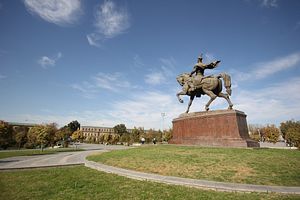Soon after the Uzbek Ministry of Justice proposed legal change that will fine government officials for failing to use the Uzbek language in written business, Russian media picked up the story and characterized the development as a sign of incoming discrimination toward the country’s Russian-speaking population. Such stories fit well into official Moscow’s narrative of Russia being a besieged fortress, under the attack by foreign threats and thus justifying its perpetually offensive stance toward foreign countries.
But the chain of events did not stop with critical media stories. On May 14, Maria Zakharova, a spokesperson from the Russian Ministry of Foreign Affairs, politicized the matter by stating that supporters of the proposed edits to the law in Uzbekistan are in the minority and the “preservation of the Russian language in official usage fully corresponds to the spirit of history and the modern relations, and most importantly, to the interests of numerous citizens of Uzbekistan, who often make the choice in favor of studying or working in Russia.”
While transgressions by Moscow invoking language, history, and culture are usually directed toward the Baltic states, Georgia, and more recently Ukraine, the Central Asian states have tended to stay out of such debates by not provoking Russia. Zakharova’s statement is the first time in the history of independent Uzbekistan that a Russian official has made a comment on such a domestic matter. Not only is language an internal matter, but Uzbekistan has been independent for 29 years following the collapse of the Soviet Union.
This incident reveals several wounds. First, a lack of respect to the state language among Uzbek officials. The Uzbek language is written into the constitution of Uzbekistan as the only state language; the law on language was adopted in 1995. Despite this, Tashkent elites educated in Russian-schools demoted the Uzbek language to a secondary language in practice, and the government failed to increase the status of the Uzbek language in the past quarter century.
Second, Russia continues to interfere in the internal affairs of its former Soviet constituent states, as if to remind them of its dominant role in relations. Central Asian states are becoming an increasing focus and target for Russia. A previous similar incident happened in 2018 when Russian Foreign Minister Sergey Lavrov criticized Kazakhstan, a fellow member of the Eurasian Economic Union (EAEU), for introducing visa-free arrangements to U.S. citizens without consulting Moscow. At least in this incident, Kazakhstan responded immediately asserting that the visa issue was an internal decision for a sovereign country to make, and the EAEU is not a political organization.
Third, it took three days for the Uzbek Ministry of Foreign Affairs to respond to Zakharova’s statement after the agency’s muteness was commented on by local media repeatedly. When a statement was finally issued, its first sentence read: “In response to discussions in mass-media and social networks…” instead of “In response to the statement of Russia’s Ministry of Foreign Affairs.” The ministry preferred to react to its own citizens instead of the originator of the statement.
Russia has been on a path reviving its arguable colonial dominance over neighboring states since Vladimir Putin came to power. The Soviet past has always been a convenient tool in justifying interference into the internal affairs of former constituent states, and Zakharova’s reference to the “spirit of history” is a well-known phrase in that debate. Tashkent’s delayed response sets a bad precedent as the country is entering as an observer to the Russia-led Eurasia Economic Union. Moscow might come away from this series of events feeling secure in the dynamics which position Russia in a dominant role.

































